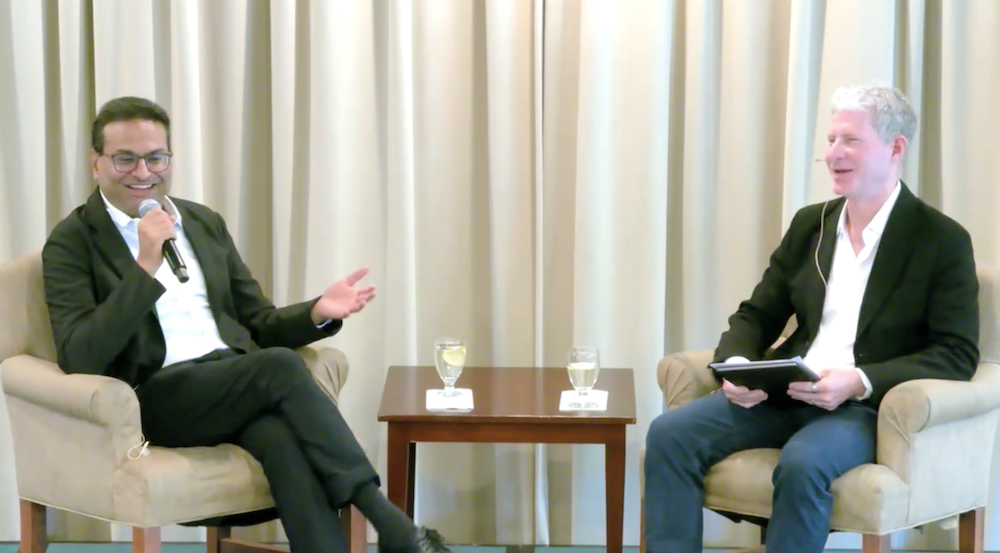Laxman Narasimhan, former Starbucks and Reckitt CEO, shares purpose-driven, strategic leadership lessons at San Francisco State University

Photo (left to right): Laxman Narasimhan, former CEO of Starbucks and Reckitt, and former CCO of PepsiCo, and SFSU alum Chris Larsen (B.S., '84), Co-Founder and Executive Chairman of Ripple, Inc. speaking at the Lam-Larsen Distinguished Lecture Series event held on October 28, 2025 at SFSU.
The third installment of the Lam-Larsen Distinguished Lecture Series featured Laxman Narasimhan, former CEO of Starbucks and Reckitt, and former CCO of PepsiCo, with alumnus Chris Larsen (B.S., '84), Co-Founder and Executive Chairman of Ripple, Inc., serving as moderator. Laxman’s message blended a global perspective, empathy and humility. The discussion centered on his remarkable personal journey filled with life-changing challenges and unexpected opportunities, his leadership philosophy, and insights on global business, technology, empathy, and social responsibility.
Held on October 28, 2025 at the Seven Hills Conference Center at San Francisco State University (SFSU), the event kicked off with welcome remarks from SFSU President Lynn Mahoney who emphasized the value of events like these in exposing students—many of them first-generation college students —to accomplished leaders.
Laxman traced his journey from modest beginnings in India to being an operating leader in a business in India to arriving in the U.S. with a few thousand dollars in his pocket and two suitcases to attend the Wharton School of the University of Pennsylvania. He credited his mother’s insistence on attaining a higher education as the foundation for his success, stressing that “education was the way out.”
From his consulting roles with McKinsey around the world, Laxman’s career evolved into leadership positions at large multinational corporations, including running major parts of PepsiCo, being the CEO at Reckitt during the COVID-19 pandemic and after, and Starbucks, where, as CEO, he focused on human-centered leadership. His style of leadership involves earning trust by listening, learning foreign languages to communicate and connect more with employees in other countries, and working in frontline roles alongside employees, such as his six-month stint as a barista at over 38 Starbucks stores around the globe. Describing himself as a servant leader, he continued to work monthly in stores over his tenure. Laxman explained he has a hands-on operational approach to running organizations, recognizing the value created at the point of sale, in stores or in the operations of a company. He argued that the key to managing massive global organizations and driving transformation is not just in the thinking, but in winning the hearts and minds of employees by understanding people’s cultures, motivations and values, not just enforcing systems or targets.
In recounting his Reckitt tenure during COVID-19, Laxman described the operational intensity of running a company that found itself in the middle of a global crisis. He and his team acted early to substantially increase Lysol production and used social media to promote hygienic handwashing techniques to reduce the spread of viruses and bacteria, highlighting business as a force for public health. He stated that the company balanced very strong shareholder returns with investing in the business and operating responsibly in a changing society.
Laxman spoke on global business trends, including AI-driven workforce shifts, growing economic inequality, and the need for empathy in leadership. He argued against claims by some that there is “too much empathy,” contending that the world suffers from too little empathy. He warned of rapid white-collar job displacement over the next decade and called for reimagined labor relations emphasizing skill-building, apprenticeships, and collaboration between business, unions and government.
Laxman urged companies to engage constructively with public policy and argued that business leaders today must become “tri-sector athletes”—operating across the private, public, and social sectors to address systemic global issues.
The event closed with a brief Q&A session with the audience, primarily comprised of SFSU students, faculty and staff. Laxman urged everyone to embrace lifelong learning, especially in the age of AI, and reminded everyone that true success stems from purpose, service, humility and cultivating inner strength.